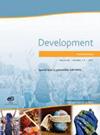Transitions in development - an interview with Kara McKinley.
IF 3.7
2区 生物学
Q1 DEVELOPMENTAL BIOLOGY
引用次数: 0
Abstract
Kara McKinley is an Assistant Professor of Stem Cell and Regenerative Biology at Harvard University and a Freeman Hrabowski Scholar of the Howard Hughes Medical Institute. Kara's group studies the uterus to understand the biology of menstruation, advancing both reproductive health and regenerative biology through rodent models. We spoke to Kara over Teams to learn more about her transition to becoming a group leader, her insights on navigating the competitive tenure-track market in biology and her dedication to promoting gender diversity within academia.
开发中的过渡——对卡拉·麦金利的采访。
卡拉·麦金利是哈佛大学干细胞和再生生物学助理教授,也是霍华德·休斯医学研究所的弗里曼·赫拉博斯基学者。卡拉的小组通过研究子宫来了解月经的生物学,通过啮齿动物模型来推进生殖健康和再生生物学。我们通过《团队》采访了卡拉,了解了她如何转变为团队领导者,她对如何在竞争激烈的生物学终身教职市场中找到方向的见解,以及她对促进学术界性别多样性的贡献。
本文章由计算机程序翻译,如有差异,请以英文原文为准。
求助全文
约1分钟内获得全文
求助全文
来源期刊

Development
生物-发育生物学
CiteScore
6.70
自引率
4.30%
发文量
433
审稿时长
3 months
期刊介绍:
Development’s scope covers all aspects of plant and animal development, including stem cell biology and regeneration. The single most important criterion for acceptance in Development is scientific excellence. Research papers (articles and reports) should therefore pose and test a significant hypothesis or address a significant question, and should provide novel perspectives that advance our understanding of development. We also encourage submission of papers that use computational methods or mathematical models to obtain significant new insights into developmental biology topics. Manuscripts that are descriptive in nature will be considered only when they lay important groundwork for a field and/or provide novel resources for understanding developmental processes of broad interest to the community.
Development includes a Techniques and Resources section for the publication of new methods, datasets, and other types of resources. Papers describing new techniques should include a proof-of-principle demonstration that the technique is valuable to the developmental biology community; they need not include in-depth follow-up analysis. The technique must be described in sufficient detail to be easily replicated by other investigators. Development will also consider protocol-type papers of exceptional interest to the community. We welcome submission of Resource papers, for example those reporting new databases, systems-level datasets, or genetic resources of major value to the developmental biology community. For all papers, the data or resource described must be made available to the community with minimal restrictions upon publication.
To aid navigability, Development has dedicated sections of the journal to stem cells & regeneration and to human development. The criteria for acceptance into these sections is identical to those outlined above. Authors and editors are encouraged to nominate appropriate manuscripts for inclusion in one of these sections.
 求助内容:
求助内容: 应助结果提醒方式:
应助结果提醒方式:


